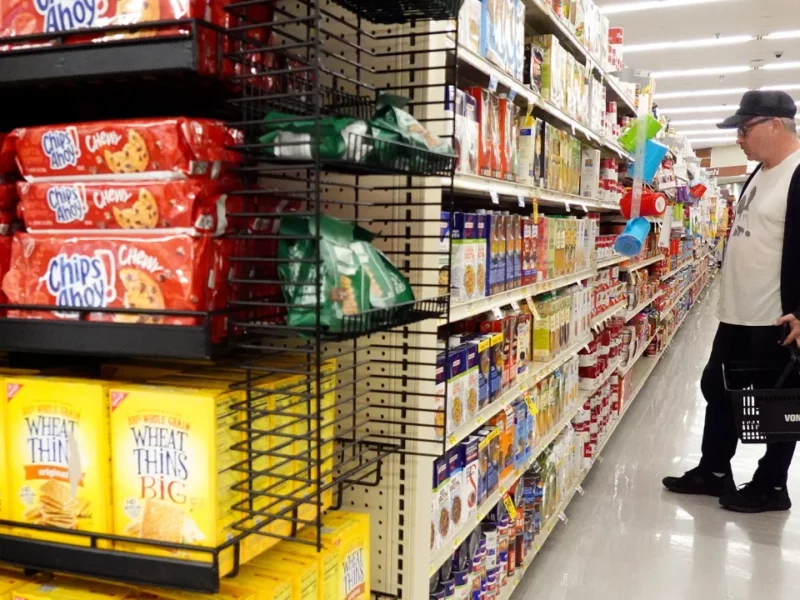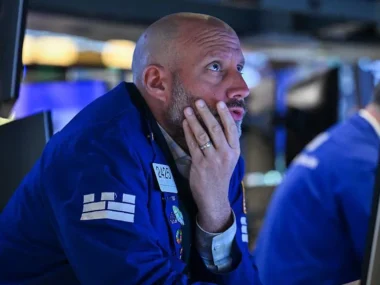Americans are growing more pessimistic about the economy, especially with interest rates reaching a 22-year high and a widely anticipated slowdown in economic growth. According to a preliminary reading released on Friday, the University of Michigan’s measure of consumer sentiment dropped by 5% in November. This marks the fourth consecutive month of declining sentiment, following a period of improvement during the summer.
The decline is primarily attributed to the anticipated impact of higher interest rates. Additionally, ongoing conflicts in Gaza and Ukraine weighed on many consumers, as mentioned by Joanne Hsu, the director of the university’s surveys of consumers.
The shift in consumer sentiment varied significantly among different groups. Young and lower-income consumers in the US experienced the most significant decline in sentiment at the beginning of the month. In contrast, sentiment among the top tercile of stockholders improved by 10%, reflecting the recent strength in equity markets, according to the release.
Simultaneously, there has been a deterioration in both short-term and long-term inflation expectations this month. The projections for Americans’ expectations regarding inflation rates in the coming year increased to 4.4% in November, compared to October’s reading of 4.2%. This represents a significant uptick from September’s 3.2% and marks the highest reading since November 2022.
In a concerning development for the Federal Reserve, long-term inflation expectations surged to 3.2% this month, reaching the highest level since 2011. The Federal Reserve closely monitors public perceptions of inflation, recognizing that if individuals come to accept elevated prices as the new norm, it can significantly complicate the central bank’s efforts to control inflation.
Jeffrey Roach, Chief Economist at LPL Financial, emphasized in an analyst note on Friday that investors should anticipate the Fed underscoring its commitment to the 2% inflation target. However, the increase in long-term inflation expectations suggests that consumers remain unconvinced about the Fed’s ability to fulfill its inflation mandate.
The Federal Reserve Aims to Decelerate Demand.
Federal Reserve Chair Jerome Powell provided a reality check to financial markets on Thursday, stating that it remains uncertain whether inflation is progressing toward the central bank’s 2% target.
Federal Reserve Chair Jerome Powell delivered a reality check to financial markets on Thursday, cautioning that the certainty of inflation aligning with the central bank’s 2% target is still uncertain. Speaking at a conference hosted by the International Monetary Fund in Washington, Powell acknowledged the unpredictability of inflation trends, stating, “We know that ongoing progress toward our 2% goal is not assured: Inflation has given us a few head fakes. If it becomes appropriate to tighten policy further, we will not hesitate to do so.”
Following Powell’s remarks, stocks experienced a decline, breaking the S&P 500 index’s longest winning streak since November 2021, while Treasury yields surged. However, equities showed a rebound on Friday morning.
Powell emphasized that successful inflation control may necessitate a slowdown in demand, recognizing the strides made in the past year. The Fed’s preferred inflation measure, the Personal Consumption Expenditures price index, registered a 3.4% increase in September compared to a year earlier, a decline from its four-decade peak of 7.1% in June 2022, although it remained unchanged from August.
Meanwhile, the core index, excluding volatile food and energy prices, showed a 3.7% increase in the 12 months ending in September, a slight improvement from the 3.8% annual rise observed in August.
The decline in inflation appears to have slowed down a bit, having steadily decreased over the past year. Federal Reserve officials have emphasized their uncertainty about whether inflation has truly been brought under control.
This uncertainty leaves room for the possibility of another Fed rate hike, although the timing remains unclear. According to the FedWatch tracking tool, investors are anticipating the Fed to maintain rates for a third time during its upcoming policy meeting in December.
Some Fed officials have recently expressed the view that the central bank can afford to postpone rate increases as they await more data. Richmond Fed President Thomas Barkin, in a discussion in New Orleans on Thursday, suggested that holding rates steady would be a prudent move, as the economy may not have yet fully experienced the impacts of the Fed’s previous 11 rate hikes.











